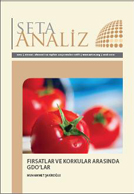With July 22nd set for national elections, Turkish politics has entered a new phase. While AK Party is faced with the most important challenge of its political life to date, Turkish democracy is also put to the test. Over the next ten weeks, we will see a deep identity politics playing out in the Turkish political space.
The ideological fault-lines which triggered the events of the last two weeks will be decisive during and after the elections.A divisive politics of ideology threatens to create a deep division across the Turkish society. In a republic founded upon ideological absolutes, the relationship between civilian politics and official ideology has never been easy. Given the extraordinary circumstances in which the Ottoman Empire ended and the new Republic was founded, holding fast to a state ideology can be seen as a safe way to the freedom and independence of Turkey. Defining loyalty only within the confines of a narrow state ideology, however, can only lead to oppression in the 21st century.
The way Turkish political space is shared is always a contested issue. Party politics is not so much about running the state in the interest of the public but about getting ‘clearance’ from the state. The Turkish establishment, whether military or civilian, is the authority that grants or refuses clearance to parties, NGOs, newspapers, TV channels, intellectuals, academics and other actors of civil society. This is borne out by the way CHP and other political parties in Turkey are put to the test. Despite the abysmal performance of certain CHP governments in the past, they are never questioned along ideological lines. State parties never loose credibility. As a result, all civilian politics outside the fold of state parties is seen as susceptible to both economic and ideological corruption. Politics is not supposed to be the art of carrying the demands and aspirations of a weak periphery to the strong center but a way of reinforcing the self-professed legitimacy of state ideology.
The April 27th memorandum and the so-called Republic demonstrations reiterated this ideological fault-line in Turkish politics. Instead of contesting AK Party’s social and economic policies within the system of parliamentary democracy, we are expected to question AK Party’s ideological credentials. Its stated political identity and record over the last 4.5 years is not enough to get clearance. The AK Party government is asked to give up all of its policies and party program to be granted an acceptable place in the system. The military memorandum and the shameless support given to it by certain interest groups and media point to a prolonged ideological battle that will seems certain to be fought on multiple fronts.
The anti-AK Party ticket has thus ideological appeal for some but little resonance with the average person. Uniting the Turkish voter under the banner of an anti-AK Party campaign could be an effective strategy for the People’s Republican Party (CHP) but it is certainly a hard sale for the Straight Path Party (DYP) and Motherland Party (ANAP). Rallying behind CHP to block Abdullah Gul’s presidential bid is beyond ordinary political maneuvering. It is a powerfully ideological statement and will not go unnoticed among the conservative voters.
What we need to be concerned about is the prospect of a divisive identity politics dominating the July elections and beyond. Dividing the Turkish society along a secular(ist)-religious dichotomy is no less dangerous than dividing them along ethnic lines or class identities. This is especially troubling and will have devastating consequences at a time when the ethnic and sectarian divisions in neighboring Iraq are swiftly spilling over to other communities and countries in the region. An ethno-secularist neo-nationalism taking hold of Turkish politics is the last thing we need to face up to the challenges of our troubled times.
<







